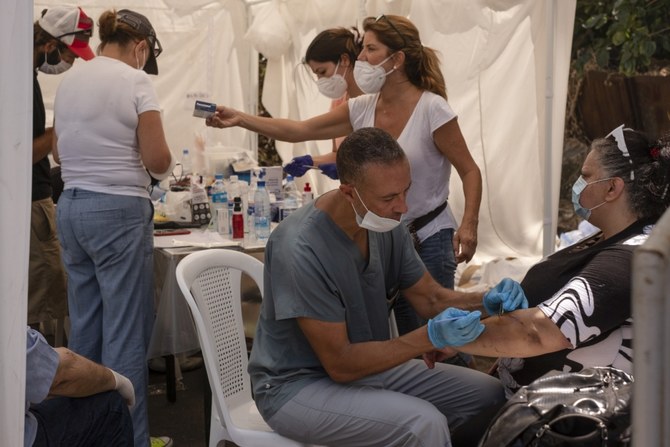
by CALINE MALEK — arabnews — BEIRUT: Volunteers from across Lebanon have flocked to support Basecamp, an initiative offering everything from food deliveries to garbage collection, from home repairs to mental health support. Under the slogan “Together, we’re stronger; we are the real government,” Basecamp unites Embrace (Lebanon’s national mental health hotline), housing project Baytna Baytak, social justice movement Minteshreen and citizens’ organization Muwatin Lebnene. “We came up with the idea of providing alternative housing for medical heroes and Red Cross members who were in touch with COVID-19 patients,” said Bouchra Boustany of Baytna Baytak. “It was launched among people who met during the revolution (in Oct. 2019), and we organized alternative housing for 450 people.”
Following the Aug. 4 Beirut port explosion, the hotlines reopened and members hit the streets once again to assist those affected. Under the slogan The phone started ringing, and I realized people didn’t want to leave their houses because they were mainly elderly, and most of them have been here for ages,” Boustany said. “We are now (providing) alternative housing to around 20 percent of applicants, and 80 percent are only asking for house repairs.” So far, Baytna Baytak has rehabilitated 225 homes, with 127 in progress and another 132 waiting on finance. “We have a double mission because COVID-19 is growing, so now we are receiving calls from medical heroes. Our aim is to reach 1,000 houses within Beirut alone,” Boustany said. And reaching those who are living alone is a high priority. “Those people are really in pain, if not physically, then psychologically. They’re destroyed. What I am doing is part of a therapy — we just can’t let them down, and it’s a struggle because we don’t have any kind of hope that anything is going to be ok.”
Samer Makarem, a strategist at Minteshreen, describes the movement as a national response. “We saw a lot happening and people trying to do things on their own. We decided that the country really needs unity, with everyone pooling their talents. We had a food box initiative before the explosion, so we were very active on a social front.” The initiative coordinates the voluntary services of Embrace, Baytna Baytak, Minteshreen and Muwatin Lebnene. Minteshreen’s intention is to form a political body to drive real political change, which Makarem says the country desperately needs. Following the blast, the organization worked on mapping operations across Beirut to dispatch the right people to the right places. “It was very difficult to see your neighbors and compatriots being reduced to waiting in line for food boxes,” Makarem said. “None of us is trained in relief and emergency; we’re just citizens who love our country, and it felt like the right thing to do.” “The trauma and emotional stress are there, and it’s pretty bleak to be in, unfortunately, but Basecamp was a beautiful experience.”
Muwatin Lebnene is another organization formed during the revolution to collect and recycle garbage, subsequently turning into a productive civic duty movement. “When the blast took place, we also felt that we needed to be on the ground,” said Muwatin Lebnene member Peter Mouracade. “(By the second day after the explosion), hundreds of selfless volunteers were there to help as much as they could, but it was messy and chaotic.” Basecamp was created to enable proper utilization of all resources and to coordinate activities, including the mapping of Beirut’s neighborhoods. So far, Baytna Baytak has rehabilitated 225 homes, with 127 in progress and another 132 waiting on finance. (Supplied) “We had access to 3,000 households and made sure we had all the data verified within the blast radius,” said Mouracade, who is also the managing director of the Toters delivery app and former CEO of the Beirut Marathon. “We also ensured we could recycle broken glass — we sorted close to 80 tonnes (88 US tons) of glass and provided shelter to those who no longer had a roof over their head.”
Basecamp has moved to a larger indoor facility in Gemmayze to provide an integrated solution. “We now have a huge warehouse, a medical center, an engineers’ station also dedicated to heritage preservation, and psychological relief on site (to dispatch where necessary),” Mouracade said. “We helped rebuild close to 500 houses and provided food to 2,000 households. This is growing on a daily basis with the help of civil society, NGOs, the Lebanese diaspora and internationals who have been helping us.”



